九年级人教版英语学习笔记
人教版九年级英语单元笔记梳理
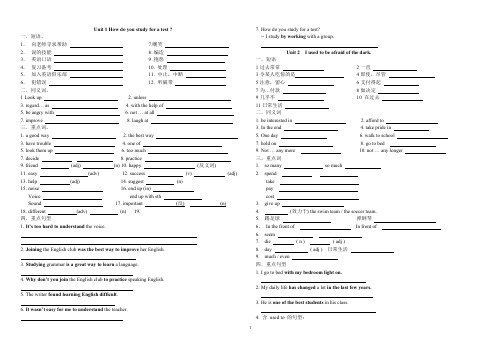
Unit 1 How do you study for a test ?一.短语。
1.向老师寻求帮助7.嘲笑2.说的技能8 .编造3.英语口语9 .抱怨4.复习备考10. 处理5.加入英语俱乐部11. 中止,中断6.犯错误12. 听磁带二.同义词。
1 Look up 2. unless3. regard… as4. with the help of5. be angry with6. not … at all7. improve 8. laugh at三.重点词。
1. a good way2. the best way3. have trouble4. one of5. look them up6. too much7. decide 8. practice9. friend (adj) (n) 10. happy (反义词)11. easy (adv) 12. success (v) (adj) 13. help (adj) 14. suggest (n)15. noise 16. end up (in)Voice end up with sthSound 17. important (反) (n) 18. different (adv) (n) 19.四.重点句型1. It’s too hard to understand the voice.2. Joining the English club was the best way to improve her English.3. Studying grammar is a great way to learn a language.4. Why don’t you join the English club to practice speaking English.5. The writer found learning English difficult.6. It wasn’t easy for me to understand the teacher.7. How do you study for a test?-- I study by working with a group..Unit 2 I used to be afraid of the dark.一.短语1过去常常2一直3令某人吃惊的是4即使,尽管5注意,留心6支付得起7为…付款8做决定9几乎不10 在过去11日常生活二.同义词1. be interested in2. afford to3. In the end4. take pride in5. One day6. walk to school7. hold on8. go to bed9. Not … any more 10. not … any longer 三.重点词1.so many so much2.spendtakepaycost3.give up4.(效力于) the swim team / the soccer team.5.踢足球弹钢琴6.In the front of In front of6.seem7.die ( n ) ( adj )8.day ( adj ) 日常生活9.much / even四.重点句型1. I go to bed with my bedroom light on.2. My daily life has changed a lot in the last few years.3. He is one of the best students in his class.4. 含used to 的句型:肯定句:否定句:一般疑问句:5. be used toused to6 with the door / window With the lightUnit3 Teenagers should be allowed to choose their own clothes.一短语1 打…的耳动2 代替,而不是3 在校期间的晚上4 打扫5 到达6 对…严格要求7 集中精力于8 两个…都9 目前10 有机会做11 养老院12 驾照13 同意sb 14 不同意sb16 担心17 实现sb 的梦想18 做决定19 关注20 职业运动员21 答复22 至少23 …的重要性二同义词1 achieve one’s dream2 get to3 go back / come back4 give back三重点词1 stop2 seem3 need4 noise (adj)5 like (prep)6 sleep (adj)7 other8 others 9 another10 the other 11 sixteen –year –old12 realize sixteen—year—olds13 succeed (n) (adj) (adv)14 own (v) (adj)15 too either also16 Saturday afternoon 17 be strict sb18 stay up 19 would like20 be strict sb be strict sth 四重点句型1. 含情态动词的被动语态;肯定句:否定句:疑问句:2mustcan’tcould / mightmay3Teenagers should be allowed to choose their own clothes..4I think students should be allowed to do homework with friends.--I disagree. They talk instead of doing homework.5I don’t think sixteen-year-olds should be allowed to drive.--I agree. They aren’t serious enough.6 Longer vacation would give us time to do things like volunteering.7 Last summer I had an opportunity to volunteer at the local hospital.8 Everyone need to have at least eight hours’ sleep a night.Unit 4 What would you do if you had a million dollars?一.短语1 医疗机构2 穿衬衫打领带3 如果…该怎么办4 太… 而不能5 害怕6 当众,公开地7 变得紧张8 几乎不9 在… 的前面10 未经允许11 感冒12 征求某人的允许13 下次14 介绍自己15 足够多的16 和… 相处17 而不是18 立刻,马上19英语演讲比赛20 名列前茅21 急救22 出版,发行23 偶然地,意外地24 事实上25 把sth 藏起来以免让sb看见二.同义词1.Let sb down 2 right away3 get along with4 not… in the slightest三.重点词1. would rather than .=2 energy (adj) create (adj) confidence (adj ) friend (adj )3 before after4 knowledge (adj )5 advice (n) suggest (n)四.重点句型。
九年级英语人教版unit3笔记

九年级英语人教版unit3笔记一、重点单词。
1. restroom.- n.(美)洗手间;公共厕所。
例如:I need to find a restroom quickly.(我需要快速找到一个洗手间。
)2. stamp.- n. 邮票;印章。
如:He collects stamps as a hobby.(他把收集邮票当作一种爱好。
)- v. 跺脚;盖章。
例如:She stamped her foot angrily.(她生气地跺了跺脚。
)3. bookstore.- n. 书店。
I bought this book at the bookstore yesterday.(我昨天在这家书店买了这本书。
)4. beside.- prep. 在……旁边;在……附近。
The park is beside the river.(公园在河边。
)5. postcard.- n. 明信片。
He sent me a postcard from Paris.(他从巴黎给我寄了一张明信片。
)6. pardon.- v. 原谅;请再说一遍。
Pardon me, I didn't catch your words.(对不起,我没听清你的话。
)- n. 原谅;宽恕。
I beg your pardon for being late.(请原谅我迟到了。
)7. washroom.- n. 洗手间;厕所(同restroom,比较口语化)。
Can you tell me where the washroom is?(你能告诉我洗手间在哪里吗?)8. bathroom.- n. 浴室;洗手间。
There is a bathtub in the bathroom.(浴室里有一个浴缸。
)9. normal.- adj. 正常的;一般的。
It's normal to feel nervous before an exam.(考试前感到紧张是正常的。
Unit3笔记人教版英语九年级全册
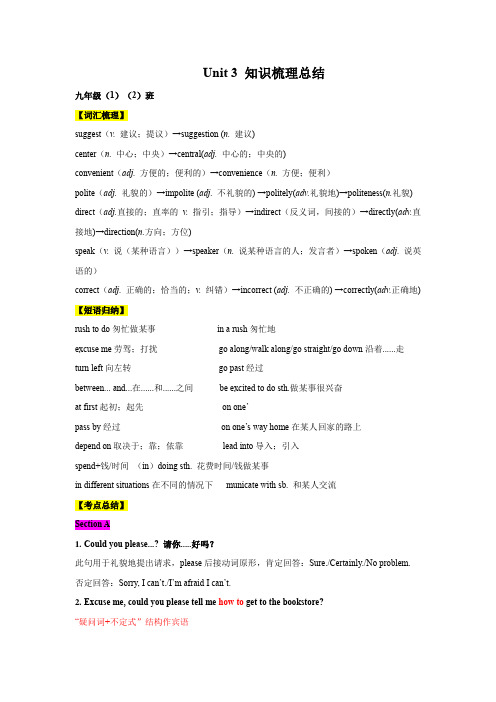
Unit 3 知识梳理总结九年级(1)(2)班【词汇梳理】suggest(v.建议;提议)→suggestion (n. 建议)center(n.中心;中央)→central(adj.中心的;中央的)convenient(adj. 方便的;便利的)→convenience(n. 方便;便利)polite(adj.礼貌的)→impolite (adj. 不礼貌的) →politely(adv.礼貌地)→politeness(n.礼貌) direct(adj.直接的;直率的v. 指引;指导)→indirect(反义词,间接的)→directly(adv.直接地)→direction(n.方向;方位)speak(v.说(某种语言))→speaker(n.说某种语言的人;发言者)→spoken(adj.说英语的)correct(adj.正确的;恰当的;v.纠错)→incorrect (adj. 不正确的) →correctly(adv.正确地)【短语归纳】rush to do匆忙做某事in a rush匆忙地excuse me劳驾;打扰go along/walk along/go straight/go down沿着......走turn left向左转go past经过between... and...在......和......之间be excited to do sth.做某事很兴奋at first起初;起先on one’pass by经过on one’s way home在某人回家的路上depend on取决于;靠;依靠lead into导入;引入spend+钱/时间(in)doing sth. 花费时间/钱做某事in different situations在不同的情况下municate with sb. 和某人交流【考点总结】Section A1.Could you please...? 请你.....好吗?此句用于礼貌地提出请求,please后接动词原形,肯定回答:Sure./Certainly./No problem.否定回答:Sorry, I can’t./I’m afraid I can’t.2.Excuse me, could you please tell me how to get to the bookstore?“疑问词+不定式”结构作宾语①how to do e.g. Please tell me how to deal with these old books.②what to do e.g. Could you please tell me what to do next.③when to do e.g. We haven’t decided when to start.3.问路及指路的表达方式.问路:Could you please tell me the way to...?Where is...?Do you know if there is a ... near here?Can you tell me how I can get to...?指路:Go along/Walk alone/Go down the street until...Turn left at the second turning/crossing.4.The bookstore is on your right, beside the bank.beside (prep.) 在......旁边;在.....附近 e.g. The bookstore is beside the mall.besides (prep.) 除.....之外(还)... e.g. We also like chemistry besides physics.5.You don’t need to rush.(1)作动词,意为“仓促;匆忙行事”rush out of冲出rush into 冲进......里(2)作名词,意为“仓促;匆忙”in a rush仓促;匆忙作名词,还可意为“特别忙碌的时期”at the rush hour在(交通)高峰期6.I was scared at first, but shouting did help.在英语中,通常把助动词do/does/did放在动词原形前,用以加强语气,意为“真的;的确”。
九年级上册英语人教版笔记

九年级上册英语人教版笔记一、Unit 1 How can we become good learners?1. 重点单词。
- aloud:adv. 大声地;出声地。
例如:Read aloud so that we can all hear you.(大声朗读以便我们都能听到你。
)- pronunciation:n. 发音;读音。
Your pronunciation is very good.(你的发音很好。
)- patient:adj. 有耐心的;n. 病人。
Be patient with children.(对孩子们要有耐心。
)- expression:n. 表达(方式);表示。
Facial expressions can show our feelings.(面部表情能展示我们的感受。
)2. 重点短语。
- by doing sth.:通过做某事。
We can improve our English by reading English books.(我们可以通过读英语书提高英语。
)- make mistakes:犯错。
Everyone makes mistakes when they learn something new.(每个人在学习新东西的时候都会犯错。
)- look up:查阅;抬头看。
Look up the new word in the dictionary.(在词典里查阅这个新单词。
)3. 重点句型。
- How do you study for a test?(你如何为考试而学习?)- I study by working with a group.(我通过小组合作来学习。
)- The more you read, the faster you'll be.(你读得越多,你就会读得越快。
)二、Unit 2 I think that mooncakes are delicious!1. 重点单词。
Unit5笔记人教版英语九年级全册

Unit 5知识梳理总结【词汇梳理】coin(n.硬币)→Every coin has two sides. 凡事都有两面性。
glass(n.玻璃,不可数名词)→glasses(pl. 玻璃杯,可数名词)→a glass of milk一杯牛奶→a pair of glasses一副眼镜produce(v.生产;制造)→ product (n. 产品;制品)→ production (n. 生产)wide(adj.宽的)→ widely (adv. 广泛地;普遍地)→width(n.宽度;广度)France(法国)→ French (adj. 法国的;法国人的)boss(n.老板;上司)→ bosses (pl.)leaf(n.叶;叶子)→ leaves (pl.)grass(n.草地;草坪)→keep off the grass勿踏草坪Germany(n.德国)→ German (adj. 德国的;德语的;n. 德语;德国人)→ Germans (pl.)plete (v.完成)→pletely (adv.)form(n.形式;类型;使形成)→form a good habit养成好习惯fair(n.展览会;交易会)→(adj.公平的)→unfair( 反义adj.不公平的)【短语归纳】be made of... 由.....制成(能看出原材料)be made from... 由.....制成(看不出原材料)be made in... 在......制造be known /famous/wellknown for... 以......闻名be known /famous/wellknown as... 作为......而出名be known /famous/wellknown to... 为......所熟知as far as I know据我所知by hand手工avoid doing sth. 避免做某事no matter无论find out查明;弄清turn...into...将......变成......send out发送;发出be covered with覆盖着paper cutting剪纸【考点总结】1.be famous for,be famous as, be famous to①be famous for... 意为“因......而闻名”,后接原因,通常是名词。
人教版九年级英语单元笔记梳理

15 足够多的 17 而不是 19 英语演讲比赛
16 和 … 相处 18 立刻,马上 20 名列前茅
21 急救 23 偶然地,意外地
22 出版,发行 24 事实上
25 把 sth 藏起来以免让 sb 看见 二. 同义词
1. Let sb down
2 right away
3 get along with 三. 重点词
4 He might be running to catch a bus.
3 What if I don’t know anyone?
5 My parents called the police, but they can’t find anything strange.
4 I don ’t know what to say or to do.
Prefer =
.
2. a great place
(adj) 4. Italy
(n )
6. agree
.
(否定 )
.
.
. (adj)
(n)
.
8. look for 9. can’t stand
find out 10. clear
(adv)
学习必备
11. would like
12 exhibit
(N)
because of 8 happy 10 forget
Unit5 It must belong to Carla
2 属于 4 编造,构成 6 逃离 8 上车 10 迟到
2 author 4 gift 6 use up
sth (反 )
2 pretend 4 whose 6 try 7 look / feel 9 let / make 11 remember
九年级下册英语笔记人教版
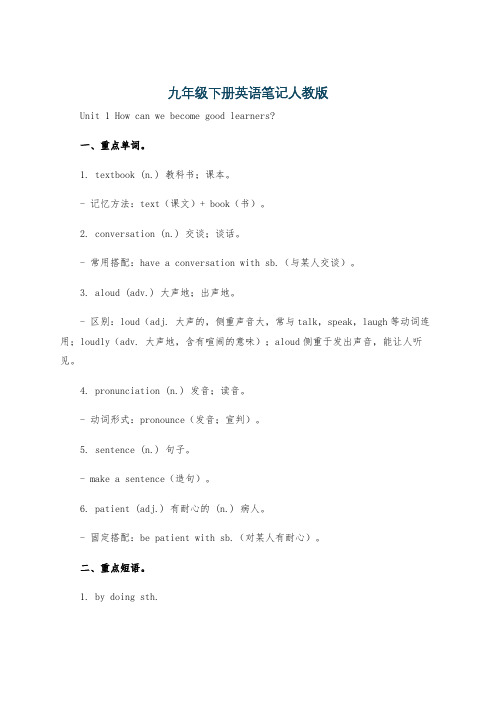
九年级下册英语笔记人教版Unit 1 How can we become good learners?一、重点单词。
1. textbook (n.) 教科书;课本。
- 记忆方法:text(课文)+ book(书)。
2. conversation (n.) 交谈;谈话。
- 常用搭配:have a conversation with sb.(与某人交谈)。
3. aloud (adv.) 大声地;出声地。
- 区别:loud(adj. 大声的,侧重声音大,常与talk,speak,laugh等动词连用;loudly(adv. 大声地,含有喧闹的意味);aloud侧重于发出声音,能让人听见。
4. pronunciation (n.) 发音;读音。
- 动词形式:pronounce(发音;宣判)。
5. sentence (n.) 句子。
- make a sentence(造句)。
6. patient (adj.) 有耐心的 (n.) 病人。
- 固定搭配:be patient with sb.(对某人有耐心)。
二、重点短语。
1. by doing sth.- 意思:通过做某事。
例如:You can improve your English by reading English books.(你可以通过读英语书提高英语水平。
)2. make mistakes.- 意思:犯错。
例如:Everyone makes mistakes when they learn something new.(每个人在学习新东西的时候都会犯错。
)3. look up.- 意思:(在词典、参考书中或通过电脑)查阅;抬头看。
例如:Look up the word in the dictionary if you don't know it.(如果你不认识这个单词就查字典。
)三、重点句型。
1. What about reading aloud to practice pronunciation?- 分析:What about...? 用于提出建议或征求意见,其后接名词、代词或动名词形式。
Unit10笔记人教版英语九年级全册

Unit 10 知识梳理总结【词汇梳理】greet(v.和......打招呼;迎接)→ greeting (n. )relax(v.放松;休息)→ relaxed (adj. 放松的;自在的)→ relaxing (adj. 令人放松的)value(n.价值)→valuable(adj.贵重的;宝贵的)→ be of great value很有价值north(n.北;北方;adv.朝北;向北)→northern(adj.北方的;北部的)east(n.东;东方;adv.朝东;向东)→eastern(adj.东方的;东部的)behave(v.表现;举止)→ behavior (n. 行为;举止;态度)→wellbehaved表现好的suggest(v.建议)→ suggestion (n. 建议)drop by(顺便拜访)→ dropped(过去式;过去分词)【短语归纳】shake hands握手be supposed to do 应该做某事for the first time首次;第一次make mistakes犯错误as soon as 一......就...... hold out伸出to one’s surprise令某人惊讶的是find out查明;弄清(情况)the capital of... ......的首都at noon在中午be/get mad at/with sb. 对某人很生气drop by顺便拜访;随便进入as...as sb. can/could某人尽可能...... on time准时after all毕竟;终归get mad大动肝火;气愤make an effort做出努力big deal重要的事;大人物on/at the coast在海边knock on/at the door敲门table manners餐桌礼仪take off脱下(衣服);(飞机)起飞be worth doing值得做...... stick sth. into将某物插入point at指向go out of one’s way特地;格外努力make sb. feel at home使某人感到宾至如归be excited about... 对......感到兴奋look forward to+doing 期望做某事show up出现;露面【考点总结】1.You’re supposed to shake hands.be supposed to 应该,相当于shoulde.g.We are supposed to help each other.=We should help each other.【注】suppose意为“认为;推断”时,其后常接宾语从句,在宾语从句中否定要前移。
Unit8笔记人教版英语九年级全册
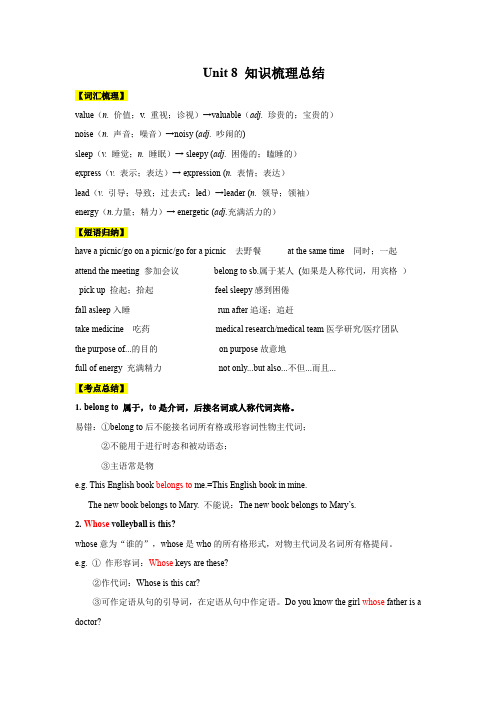
Unit 8 知识梳理总结【词汇梳理】value(n.价值;v. 重视;诊视)→valuable(adj.珍贵的;宝贵的)noise(n.声音;噪音)→noisy (adj. 吵闹的)sleep(v.睡觉;n.睡眠)→ sleepy (adj. 困倦的;瞌睡的)express(v.表示;表达)→ expression (n. 表情;表达)lead(v.引导;导致;过去式:led)→leader (n. 领导;领袖)energy(n.力量;精力)→ energetic (adj.充满活力的)【短语归纳】have a picnic/go on a picnic/go for a picnic 去野餐at the same time 同时;一起attend the meeting 参加会议belong to sb.属于某人(如果是人称代词,用宾格)pick up 捡起;拾起feel sleepy感到困倦fall asleep入睡run after追逐;追赶take medicine 吃药medical research/medical team医学研究/医疗团队the purpose of...的目的on purpose故意地full of energy 充满精力not only...but also...不但...而且...【考点总结】1.belong to 属于,to是介词,后接名词或人称代词宾格。
易错:①belong to后不能接名词所有格或形容词性物主代词;②不能用于进行时态和被动语态;③主语常是物e.g. This English book belongs to me.=This English book in mine.The new book belongs to Mary. 不能说:The new book belongs to Mary’s.2.Whose volleyball is this?whose意为“谁的”,whose是who的所有格形式,对物主代词及名词所有格提问。
人教版九年级英语超级笔记(全一册)
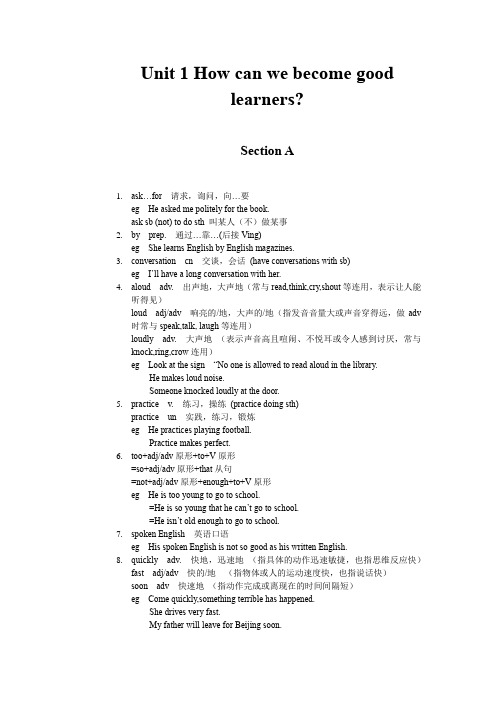
Unit 1 How can we become goodlearners?Section A1.ask…for 请求,询问,向…要eg He asked me politely for the book.ask sb (not) to do sth 叫某人(不)做某事2.by prep. 通过…靠…(后接Ving)eg She learns English by English magazines.3.conversation cn 交谈,会话(have conversations with sb)eg I’ll have a long conversation with her.4.aloud adv. 出声地,大声地(常与read,think,cry,shout等连用,表示让人能听得见)loud adj/adv 响亮的/地,大声的/地(指发音音量大或声音穿得远,做adv 时常与speak,talk, laugh等连用)loudly adv. 大声地(表示声音高且喧闹、不悦耳或令人感到讨厌,常与knock,ring,crow连用)eg Look at the sign---“No one is allowed to read aloud in the library.He makes loud noise.Someone knocked loudly at the door.5.practice v. 练习,操练(practice doing sth)practice un 实践,练习,锻炼eg He practices playing football.Practice makes perfect.6.too+adj/adv原形+to+V原形=so+adj/adv原形+that从句=not+adj/adv原形+enough+to+V原形eg He is too young to go to school.=He is so young that he can’t go to school.=He isn’t old enough to go to school.7.spoken English 英语口语eg His spoken English is not so good as his written English.8.quickly adv. 快地,迅速地(指具体的动作迅速敏捷,也指思维反应快)fast adj/adv 快的/地(指物体或人的运动速度快,也指说话快)soon adv 快速地(指动作完成或离现在的时间间隔短)eg Come quickly,something terrible has happened.She drives very fast.My father will leave for Beijing soon.9.word by word 逐字地day by day 日复一日one by one 逐个10.patient adj 有耐心的,耐烦的(be patient with/to…对…有耐心)n 病人eg We all like Mr.Smith.He is very patient with us.The nurse is looking after the patient.11.not…everything 表示部分否定,could not understand everything “并非每件事都能理解”当every,all,always等表示整体意义的词与not连用时,表示部分否定eg I didn’t find everyone on the playground.Not all balls are round in the USA.12.secret cn 秘密,机密(keep a secret保密;in secret秘密地)adj 秘密的,隐秘的eg Exercising every day is the secret of health.It’s a secret passage.13.look up (在字典或资料中)查找;向上看,仰视eg I’ve forgotten the number,you should look it up again.They looked up,and found many locusts.14.repeat =do or say…again15.take a note/take notes 记笔记16.memorize v 记忆,记住(指有意识地用心地去记,强调主观的动作过程memory nremember v 记得(指某件事或印象在记忆里,一般不需要有意识地去记忆便可以想起)eg She tried to memorize every event.She remembered event that happened in these years.17.be afraid of doing sth 担心而害怕做某事be afraid to do sth 怕而不敢做某事eg The girl was afraid to go across the bridge,for she was afraid of falling downfrom it.Section B1.increase to 增到,增加到(后+总数)eg The population of this city has increased to 3,000,000by now.increase by 以…的幅度增加,增加了…eg The population of this factory increased by 10 percent last year.2.at the speed of 以…速度at top/full/high speed 高速,全速eg Your taxi traveled at the speed of 80 miles an hour.It’s dangerous to turn round the corner at high speed.3.be born 出身于be born with 天生具有…be born to do sth 天生能做某事eg He was born in a small village.Her cousin brother was born with a mole(胎记) on the shoulder.Man was born to cry,so it’s with other animals.4.have the ability to do sth 有能力做某事eg Jenny is the first person for the job,she has the ability to communicate.5.take an interest in=be interested in 对…感兴趣lose interest in 对…失去兴趣eg She seems to take an interest in discussing the trip.He has lost interest in fishing.6.create v 创造,创建,创作creative adj 创造性的,有创意的creation n 创造,创建7.It’s +adj +for sb to do sth 对某人来说做某事是……It’s +adj +of sb to do sth (adj是表示情感,特征的词:kind ,nice ,good ,silly ,wrong ,wise等) eg It’s hard for you to finish it.It’s kind of you to say so.8.pay attention to 注意…留心…(to是介词,后接n/pron/Ving)eg Your spoken English is a little poor.Please pay attention to it.As you see,Sam didn’t pay much attention to watching TV.9.connect…with…把…和…连接起来connect…to…把…连上eg First,the light is connected to a switch.Don’t connect the matter with what happened last week.10.even if =even though即使,纵然eg I wouldn’t give up even if I should fail a second time.I can still remember even though it happened so long ago.11. unless=if…not…如果不,除非eg You’ll be late unless you hurry.=You’ll be late if you don’t hurry.Unit 2 I think mooncakes are delicious!Section A1.a little too 太……一点eg Kevin was a little too young to dress himself.2.put on 增加(体重)发胖+weight穿上,戴上+衣物eg Last month,Joan put on some weight.Mr.Weevers put on his hat and hurried out.3.pound cn 重量单位“磅”.货币单位“英镑”eg two pounds of milkAfter the Sichuan earthquake,the British government gave away1,000,000 pounds. 4.shoot down 击落,击毁eg An US UA V was shot down in Iran last year.5.try to do sth 尽力做某事(但不一定成功).try doing sth 尝试做某事eg She tried to climb onto the bank(河岸),but failed.You always travel by train,why not try taking a bus for a change?6.steal 偷,窃取(stole stolen). steal sth from 从……偷某物eg The child stole a book from the shelf..have sth stolen 某物被偷eg She had her purse(钱包)stolen.7.so……that……如此……以至于…….so+adj/adv+that从句.so+adj+a/an+单数名词+that从句.so+many/few+复数名词+that从句.so+much/little+不可数名词+that从句eg He is so young that he can’t go to school.He made so many mistakes that he failed the exam..such……that……如此……以至于…….such+a/an+单数名词+that从句.such+复数名词/不可数名词+that从句.such+a/an+adj+n+that从句.such+adj+复数名词/不可数名词+that从句eg He is such a good student that we all believe him.It was such bad weather that we had to stay at home.y v 平放,放置(lay out 摆开,布置)产卵,下蛋eg Mrs,Turner laid out the flowerpots in her garden.How strange it is to see the hen lay two eggs a day!lie----lying----lay----lain 躺,位于lie----lying----lied----lied 撒谎lay----laying----laid----laid 平放,产卵9.admire vt 欣赏,观赏(admire sth 欣赏某物)Vt 钦佩,羡慕(admire……for……因……而钦佩……)eg Standing on the top of the mountain,you can admire the beauty of the whole city.We admire Ann for her courage.10.tie cn 领带(a shirt and tie). v 拴,扎,系,绑(tie…to…将…拴到…)eg It’s formal(正式)to wear a shirt and tie if you go to a party.Please tie your dog to the tree.11.感叹句的种类How引导的感叹句(1)How+adj+主语+谓语!(2)How+adv+主语+谓语!(3)How+adj+a/an+单数名词+主语+谓语!(4)How+主语+谓语!eg How blue the sky is!How well she danced that day!How interesting a book it is!How time flies!What引导的感叹句(1)What+a/an+单数名词+主语+谓语!(2)What +不可数名词+主语+谓语!(3)What+复数名词+主语+谓语!(4)What+a/an+adj+单数名词+主语+谓语!(5)What+adj+不可数名词+主语+谓语!(6)What+adj+复数名词+主语+谓语!eg What a horse it is!What fun it was!What colors they are!What a nice girl she is!What fine weather it was last week!What silly questions they are.Section B1.trick cn 恶作剧,闹剧(play a trick on sb 捉弄某人)eg The kids played tricks on Harvey when he was young.2.treat cn 招待,款待v 对待,把…看作(treat…as…把…看作…) eg It’s my treat.Don’t treat his words as a joke.3.dress up as+sb 装扮成某人dress up in+服装或颜色穿上…eg The kids are dressing up as pirates(海盗)Father Christmas often dresses up in red.4.mean adj 小气的,吝啬的,自私的(be mean with…对…吝啬)v 意味着,意欲mean doing sth 意味着做某事mean to do sth 打算做某事not mean to do sth 不是有意做某事eg Mr.Marley was mean with almost everything.That would mean wasting a lot of labor.Really?I don’t mean to waste any labor.I don’t mean to be late ,sir.5. business un 商业,生意.un 职责,事务,事(on business 出差).cn 商铺,商店eg Sometimes,business English is hard to learn.Mr.Wang has gone to Hainan Island on business.She has a business in Paris.5.punish sb for (doing) sth 因为(做)某事而处罚某人eg He was punished for breaking the school rules.6.warn sb of sth 警告某人某事warn sb (not) to do sth 警告某人(不)做某事warn sb +that从句eg We’ve warned the kids of the risk of electricity.We’ve been warned not to go out these days.I warned her that snakes are dangerous.7. end up doing sth 最终成为…结果为…eg I didn’t like it at first,but we ended up cheering.end up with 以…告终eg Their game ended up with a quarrel.7.present un 现在,目前(at present).cn 礼物赠品.adj 现在的,目前的.出席的,到场的eg At present,everything goes well.My uncle sent me an iPad as a birthday present.What do you think of your present company,David?The present guests were all in high spirit.8.spread v/n 传播,蔓延eg The fire spread in a short time.China has successfully controlled the spread of bird flu.(禽流感)9.hiding n 躲藏,隐藏处(in hiding 躲藏着;go into hiding 躲起来)eg Tom and his sister went into hiding when they heard the sound of their mother’s footsteps.10.hunt n 搜索,搜寻(hunt for)eg The hunt for the sunk ship(沉船) continue11.not only…but also…不但…而且…(连接两个相对称的并列成分,若连接两个主语时要实行就近原则)eg Not only Mr.lin bt also his son loves the movies.Unit 3 Could you please tell me wherethe restrooms are?Section Armation un 消息(表示通过打听、学习、观察等方式获得的资料).news un 新闻,消息(指人们感兴趣的或近来发生的事情,尤指通过广播、电视、报纸等事情).message cn 消息,口信(指口头或书信传递给他人的消息)eg We need some information.He often sends me short messages.We listen to the news on the radio.2.Could you please+V原形…….?请你…….好吗?.Could you please not+V原形……? 请你不要……好吗?(其回答中不能用could,只能用can.即Yes,I can.或No/Sorry,I can’teg Could you please be here a little earlier?Sorry,I can’t.3.beside prep 在旁边,在附近=next to/close tobesides prep 除…之外还…eg A girl is standing beside the tree.Dis anyone else come besides Jack?4.get sb sth=get sth for sb(get是“买到,弄到,得到”之意)eg Who’d like to get some chalk for me?=Who’d like to get me some chalk?5.pardon v 原谅(主要用于没听清对方说话时,恳请对方再说一遍).excuse me 打扰一下(主要用于吸引别人的注意,有麻烦或打扰之意所做之事可能会使别人不愉快或不方便,诸如插话、失陪、提出请求、纹路等)eg Can I ask you some questions?Pardon?Excuse me,can you tell me where the bank is?6.need v 需要(实义动词)need to do sth 需要去做某事need doing sth 需要被做某事eg Harold needed to bring drinks.Potatoes need cooking a little longer.7.suggest v 使人想到,使人联想,提议,建议suggest sth (to sb)=suggest (to sb) (向某人)提议/建议…suggest doing sth 提议/建议做某事suggest +that从句(虚拟语气,其谓语用should+动词原形,should常被省略)eg What did you suggest to the manager?I suggested going home at once.I suggest (that) we go out to eat.8. psaa by 经过,路过,从…旁边经过.go by 流逝,过去eg He passed by without greeting me.Time goes by.8.宾语从句(2)类型①连词that引导的宾语从句由陈述句转化而来,that无意义,that可省略eg I think (that) she’ll be back soon.He didn’t know (that) his brother was also there.that在下列情况中不宜省略主句与宾语从句间有插入语eg She said here,in her letter,that she was getting on well with her studies.出现两个或以上的宾语从句,此时只有第一个that可以省略,其余的不能省略eg Danny told me (that) he would go to Canada and that he had been there once.②连词代词who,whom,what,which,whose和when, where,why,how等引导的宾语从句由特殊疑问句转化而来,这些连接代词或连接副词在宾语从句中充当某个成分,因此不能省略。
九年级人教版英语学习笔记完整版

九年级人教版英语学习笔记Document serial number【NL89WT-NY98YT-NC8CB-NNUUT-NUT108】Unit1Howcanwebecomegoodlearners1、How引导的特殊疑问句:①询问方式或手段:“怎样”如:HowdoyoustudyEnglish?---Istudybyreadingaloud.②用于彼此间打招呼、问候、询问身体状况:如:Howdoyoudo---HowdoyoudoHowareyou---I’mfine/well/Ok.③询问天气或程度:如:How’stheweather=What’stheweatherlike?----It’ssunny/cloudy/raining.④询问年龄:如:Howoldisshe=What’sherage?---Sheis15(yearsold)⑤征求意见或建议用:Howabout=Whatabout+n/代词/V-ing.如:Howabout_______(play)basketball?⑥询问频率用:Howoften如:Howoftendoyouexercise---Onceaday.⑦询问可数名词的数量用:Howmany如:Howmanystudentsarethereinyourclass?---Thereare50studentsinourclass⑧询问不可数名词的数量用:Howmuch.如:Howmuchmeat____(be)thereinthefridge?---Onlyalittle.此外:Howmuch还可以用于询问价格。
Howmuchisyourcoat---It’s50yuan.注:询问价格用:Howmuchis/aresth=What’sthepriceofsth东西有贵(expensive=dear)贱(cheap=inexpensive),价格(price)有高(high)低(low)如:Thiscoatisverycheap. Thepriceofthiscoatisverylow.⑨询问次数用:Howmanytimes“多少次”如:Howmanytimesdoyougototheparkaweek?----Threetimes.⑩询问长度、时间长短用:Howlong如:Howlongistheboat----About3meters.Howlongwillyoustaythere?---For2days注:用Howlong提问,用:For+时间段或since+时间点回答(其中,for可以省略)。
人教版九年级上册英语第二单元笔记
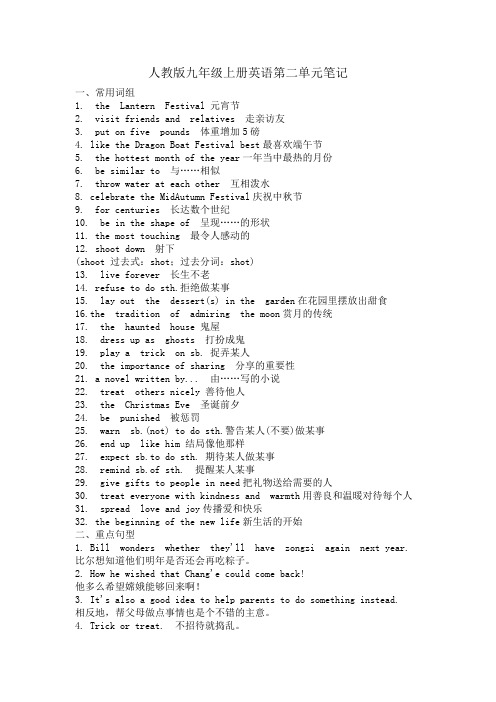
人教版九年级上册英语第二单元笔记一、常用词组1. the Lantern Festival 元宵节2. visit friends and relatives 走亲访友3. put on five pounds 体重增加5磅4. like the Dragon Boat Festival best最喜欢端午节5. the hottest month of the year一年当中最热的月份6. be similar to 与……相似7. throw water at each other 互相泼水8. celebrate the MidAutumn Festival庆祝中秋节9. for centuries 长达数个世纪10. be in the shape of 呈现……的形状11. the most touching 最令人感动的12. shoot down 射下(shoot 过去式:shot;过去分词:shot)13. live forever 长生不老14. refuse to do sth.拒绝做某事15. lay out the dessert(s) in the garden在花园里摆放出甜食16.the tradition of admiring the moon赏月的传统17. the haunted house 鬼屋18. dress up as ghosts 打扮成鬼19. play a trick on sb. 捉弄某人20. the importance of sharing 分享的重要性21. a novel written by... 由……写的小说22. treat others nicely 善待他人23. the Christmas Eve 圣诞前夕24. be punished 被惩罚25. warn sb.(not) to do sth.警告某人(不要)做某事26. end up like him 结局像他那样27. expect sb.to do sth. 期待某人做某事28. remind sb.of sth. 提醒某人某事29. give gifts to people in need把礼物送给需要的人30. treat everyone with kindness and warmth用善良和温暖对待每个人31. spread love and joy传播爱和快乐32. the beginning of the new life新生活的开始二、重点句型1. Bill wonders whether they'll have zongzi again next year. 比尔想知道他们明年是否还会再吃粽子。
Unit4笔记人教版英语九年级全册
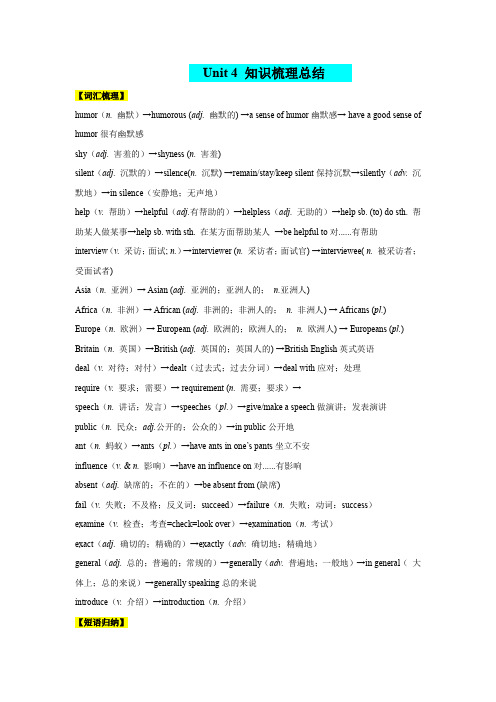
Unit 4 知识梳理总结【词汇梳理】humor(n.幽默)→humorous (adj. 幽默的) →a sense of humor幽默感→ have a good sense of humor很有幽默感shy(adj.害羞的)→shyness (n. 害羞)silent(adj.沉默的)→silence(n.沉默) →remain/stay/keep silent保持沉默→silently(adv.沉默地)→in silence(安静地;无声地)help(v.帮助)→helpful(adj.有帮助的)→helpless(adj.无助的)→help sb. (to) do sth. 帮助某人做某事→help sb. with sth. 在某方面帮助某人→be helpful to对......有帮助interview(v.采访;面试; n.)→interviewer (n.采访者;面试官) →interviewee( n.被采访者;受面试者)Asia(n.亚洲)→ Asian (adj. 亚洲的;亚洲人的;n.亚洲人)Africa(n.非洲)→ African (adj. 非洲的;非洲人的;n. 非洲人) → Africans (pl.)Europe(n.欧洲)→ European (adj. 欧洲的;欧洲人的;n. 欧洲人) → Europeans (pl.) Britain(n.英国)→British (adj. 英国的;英国人的) →British English英式英语deal(v.对待;对付)→dealt(过去式;过去分词)→deal with应对;处理require(v.要求;需要)→ requirement (n. 需要;要求)→speech(n.讲话;发言)→speeches(pl.)→give/make a speech做演讲;发表演讲public(n.民众;adj.公开的;公众的)→in public公开地ant(n.蚂蚁)→ants(pl.)→have ants in one’s pants坐立不安influence(v. & n. 影响)→have an influence on对......有影响absent(adj.缺席的;不在的)→be absent from (缺席)fail(v.失败;不及格;反义词:succeed)→failure(n.失败;动词:success)examine(v.检查;考查=check=look over)→examination(n.考试)exact(adj.确切的;精确的)→exactly(adv.确切地;精确地)general(adj.总的;普遍的;常规的)→generally(adv.普遍地;一般地)→in general(大体上;总的来说)→generally speaking总的来说introduce(v.介绍)→introduction(n.介绍)【短语归纳】be helpful to sb. 对某人有帮助get good scores/grades取得好成绩used to do sth.过去常常做某事from time to time=at times=sometimes时常;有时be interested in=have/show (an) interest in... 对......感兴趣dare to do 敢于做某事tons of很多;极多private school 私立学校public school 公立学校boarding school寄宿学校require sb.to do sth.要求某人作某事take up开始从事;占用(时间;空间)hang out闲逛give up/give it/them up 放弃/放弃它(们)give/make a speech做演讲;发表演讲in public公开地be nervous about...对......感到紧张all the time一直;总是have an influence on... 对......有影响be absent from... 缺席fail to do sth. 未能做某事in person亲身;亲自take an examination/pass the examination/fail the examination 参加考试/通过考试/考试不及格take pride in=be proud of 为......骄傲;感到自豪take care of=look after照顾look for jobs寻找工作generally speaking总的来说in general大体上;总的来说in the last few years 在过去的几年里(常用于现在完成时态)【考点总结】Section A1.This party is such a great idea!such非常,(强调程度)这样such+a/an+adj.+单数名词such+adj.+复数名词/不可数名词e.g. She is such a beautiful woman. =She is so beautiful a woman.I am surprised she made such great progress.2.It’s been three years since we last saw our primary school classmates.since conj.& prep.从......以后;自......以来;conj.因为;既然①作连词,意为“自......以后;自......以来”,连接时间状语从句,从句常用一般过去时;主句用完成时。
人教版初中英语九年级1-3单元学霸笔记
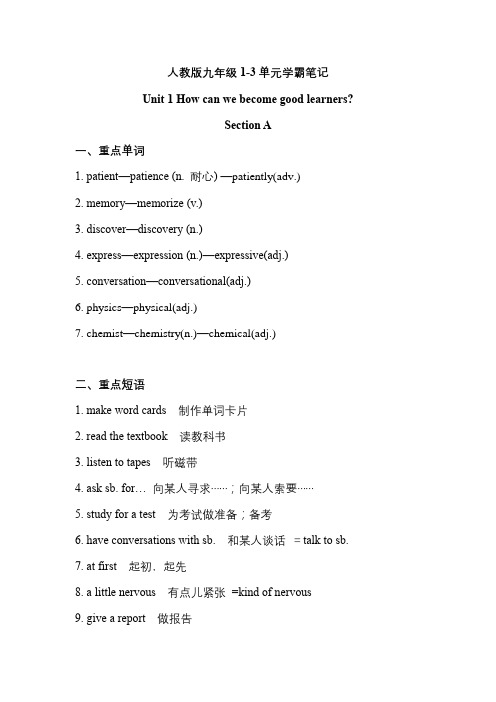
人教版九年级1-3单元学霸笔记Unit 1 How can we become good learners?Section A一、重点单词1. patient—patience (n. 耐心)—patiently(adv.)2. memory—memorize (v.)3. discover—discovery (n.)4. express—expression (n.)—expressive(adj.)5. conversation—conversational(adj.)6. physics—physical(adj.)7. chemist—chemistry(n.)—chemical(adj.)二、重点短语1. make word cards制作单词卡片2. read the textbook读教科书3. listen to tapes听磁带4. ask sb. for… 向某人寻求……;向某人索要……5. study for a test为考试做准备;备考6. have conversations with sb.和某人谈话=talk to sb.7. at first起初,起先8. a little nervous有点儿紧张=kind of nervous9. give a report做报告10. take notes记/做笔记11. word by word逐词地12. so…that如此……以至于13. write emails to sb.给某人写电子邮件14. repeat out loud大声重复15. be afraid to do sth. 害怕做某事=be afraid of doing sth.16. because of由于;因为=thanks to17. fall in love with爱上18. a piece of cake小菜一碟19. look up(在词典、参考书中或通过电脑)查阅;抬头看20. so that以便= in order that三、重点句子1. “你怎样学习英语?”“我通过向老师求助学习(英语)。
人教版九年级英语单元笔记梳理

Unit 1 How do you study for a test ?一.短语。
1.向老师寻求帮助7.嘲笑2.说的技能8 .编造3.英语口语9 .抱怨4.复习备考10. 处理5.加入英语俱乐部11. 中止,中断6.犯错误12. 听磁带二.同义词。
1 Look up 2. unless3. regard… as4. with the help of5. be angry with6. not … at all7. improve 8. laugh at三.重点词。
1. a good way2. the best way3. have trouble4. one of5. look them up6. too much7. decide 8. practice9. friend (adj) (n) 10. happy (反义词)11. easy (adv) 12. success (v) (adj) 13. help (adj) 14. suggest (n)15. noise 16. end up (in)Voice end up with sthSound 17. important (反) (n) 18. different (adv) (n) 19.四.重点句型1. It’s too hard to understand the voice.2. Joining the English club was the best way to improve her English.3. Studying grammar is a great way to learn a language.4. Why don’t you join the English club to practice speaking English.5. The writer found learning English difficult.6. It wasn’t easy for me to understand the teacher.7. How do you study for a test?-- I study by working with a group..Unit 2 I used to be afraid of the dark.一.短语1过去常常2一直3令某人吃惊的是4即使,尽管5注意,留心6支付得起7为…付款8做决定9几乎不10 在过去11日常生活二.同义词1. be interested in2. afford to3. In the end4. take pride in5. One day6. walk to school7. hold on 8. go to bed9. Not … any more 10. not … any longer三.重点词1.so many so much2.spendtakepaycost3.give up4.(效力于) the swim team / the soccer team.5.踢足球弹钢琴6.In the front of In front of6.seem7.die ( n ) ( adj )8.day ( adj ) 日常生活9.much / even四.重点句型1. I go to bed with my bedroom light on.2. My daily life has changed a lot in the last few years.3. He is one of the best students in his class.4. 含used to 的句型:1肯定句:否定句:一般疑问句:5. be used toused to6 with the door / window With the lightUnit3 Teenagers should be allowed to choose their own clothes. 一短语1 打…的耳动2 代替,而不是3 在校期间的晚上4 打扫5 到达6 对…严格要求7 集中精力于8 两个…都9 目前10 有机会做11 养老院12 驾照13 同意sb 14 不同意sb16 担心17 实现sb 的梦想18 做决定19 关注20 职业运动员21 答复22 至少23 …的重要性二同义词1 achieve one’s dream2 get to3 go back / come back4 give back三重点词1 stop2 seem3 need4 noise (adj)5 like (prep)6 sleep (adj)7 other8 others 9 another10 the other 11 sixteen –year –old12 realize sixteen—year—olds13 succeed (n) (adj) (adv)14 own (v) (adj)15 too either also16 Saturday afternoon 17 be strict sb18 stay up 19 would like20 be strict sb be strict sth四重点句型1. 含情态动词的被动语态;肯定句:否定句:疑问句:2mustcan’tcould / mightmay3Teenagers should be allowed to choose their own clothes..4I think students should be allowed to do homework with friends.--I disagree. They talk instead of doing homework.5I don’t think sixteen-year-olds should be allowed to drive.--I agree. They aren’t serious enough.6 Longer vacation would give us time to do things like volunteering.7 Last summer I had an opportunity to volunteer at the local hospital.8 Everyone need to have at least eight hours’sleep a night.Unit 4 What would you do if you had a million dollars?一.短语1 医疗机构2 穿衬衫打领带3 如果…该怎么办4 太…而不能5 害怕6 当众,公开地7 变得紧张8 几乎不9 在…的前面10 未经允许11 感冒12 征求某人的允许13 下次14 介绍自己15 足够多的16 和…相处17 而不是18 立刻,马上19英语演讲比赛20 名列前茅21 急救22 出版,发行23 偶然地,意外地24 事实上225 把sth 藏起来以免让sb看见二.同义词1.Let sb down 2 right away3 get along with4 not… in the slightest三.重点词1. would rather than .=2 energy (adj) create (adj) confidence (adj ) friend (adj )3 before after4 knowledge (adj )5 advice (n) suggest (n) 四.重点句型。
人教版九年级英语unit11笔记

人教版九年级英语unit11笔记Unit 11Sad movies make me cry.【重点短语】1. make me sleepy 使我困倦2. drive sb. crazy 使……发疯3. the more…, the more 越……越……4. yes and no 好坏参半5. be friends with sb. 是某人的朋友6. feel left out 感觉被忽视7. sleep badly 睡眠很差8. don’t feel like eating 不想吃东西9. for no reason 毫无理由10. neither…nor…既不……也不……11. let…down 使…失望12. take one’s position 替代我的职位13. to start with 起初14. get the exam result back 取考试成绩单15. find out 发现16. a shirt of a happy person 一件快乐人的衬衫【重点句型】1. —I’d rather go to Blue Ocean because I like to listen to quiet music while I’m eating. 更愿意到蓝海洋餐厅,因为我喜欢在吃饭时听轻音乐。
—But that music make me sleepy. 但那种音乐使我困倦。
2. Waiting for Amy drove Tina crazy. 等候艾米使蒂娜发狂。
3. The movie was so sad that it made Tina and Amy cry. 这部电影是如此悲伤以致使蒂娜和艾米都哭了。
4. Sad movies don’t make John cry. They just make him want to leave quickly. 悲伤的电影没有让约翰哭他们只能使他想尽快离开。
Unit9笔记人教版英语九年级全册
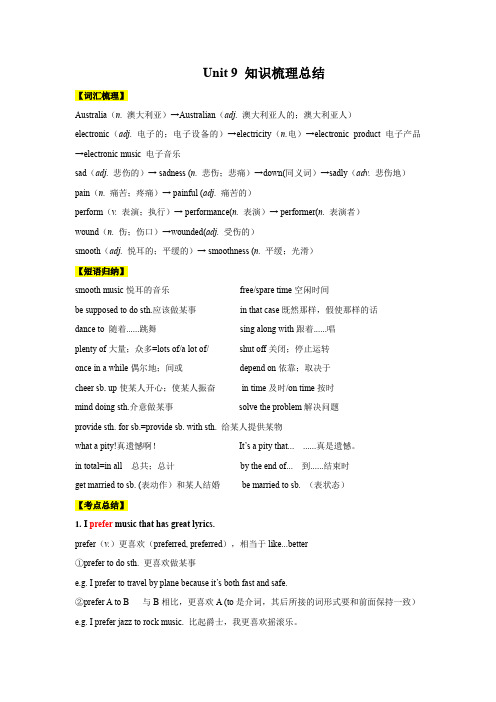
Unit 9 知识梳理总结【词汇梳理】Australia(n.澳大利亚)→Australian(adj.澳大利亚人的;澳大利亚人)electronic(adj.电子的;电子设备的)→electricity(n.电)→electronic product电子产品→electronic music 电子音乐sad(adj.悲伤的)→ sadness (n. 悲伤;悲痛)→down(同义词)→sadly(adv.悲伤地)pain(n.痛苦;疼痛)→ painful (adj. 痛苦的)perform(v.表演;执行)→ performance(n. 表演)→ performer(n. 表演者)wound(n.伤;伤口)→wounded(adj. 受伤的)smooth(adj.悦耳的;平缓的)→ smoothness (n. 平缓;光滑)【短语归纳】smooth music悦耳的音乐free/spare time空闲时间be supposed to do sth.应该做某事in that case既然那样,假使那样的话dance to 随着......跳舞sing along with跟着......唱plenty of大量;众多=lots of/a lot of/ shut off关闭;停止运转once in a while偶尔地;间或depend on依靠;取决于cheer sb. up使某人开心;使某人振奋in time及时/on time按时mind doing sth.介意做某事solve the problem解决问题provide sth. for sb.=provide sb. with sth. 给某人提供某物what a pity!真遗憾啊!It’s a pity that... ......真是遗憾。
in total=in all 总共;总计by the end of... 到......结束时get married to sb. (表动作)和某人结婚be married to sb. (表状态)【考点总结】1.I prefer music that has great lyrics.prefer(v.)更喜欢(preferred, preferred),相当于like...better①prefer to do sth. 更喜欢做某事e.g. I prefer to travel by plane because it’s both fast and safe.②prefer A to B 与B相比,更喜欢A (to是介词,其后所接的词形式要和前面保持一致)e.g. I prefer jazz to rock music. 比起爵士,我更喜欢摇滚乐。
- 1、下载文档前请自行甄别文档内容的完整性,平台不提供额外的编辑、内容补充、找答案等附加服务。
- 2、"仅部分预览"的文档,不可在线预览部分如存在完整性等问题,可反馈申请退款(可完整预览的文档不适用该条件!)。
- 3、如文档侵犯您的权益,请联系客服反馈,我们会尽快为您处理(人工客服工作时间:9:00-18:30)。
Unit1Howcanwebecomegoodlearners?1、How引导的特殊疑问句:①询问方式或手段:“怎样”如:HowdoyoustudyEnglish?---Istudybyreadingaloud.②用于彼此间打招呼、问候、询问身体状况:如:Howdoyoudo?---Howdoyoudo Howareyou?---I’mfine/well/Ok.③询问天气或程度:如:How’stheweather?=What’stheweatherlike? ----It’ssunny/cloudy/raining.④询问年龄:如:Howoldisshe?=What’sherage?---Sheis15(yearsold)⑤征求意见或建议用:Howabout=Whatabout+n/代词/V-ing.如:Howabout_______(play)basketball?⑥询问频率用:Howoften如:Howoftendoyouexercise?---Onceaday.⑦询问可数名词的数量用:Howmany如:Howmanystudentsarethereinyourclass?---Thereare50studentsinourclass⑧询问不可数名词的数量用:Howmuch.如:Howmuchmeat____(be)thereinthefridge? ---Onlyalittle.此外:Howmuch还可以用于询问价格。
Howmuchisyourcoat?---It’s50yuan.注:询问价格用:Howmuchis/aresth?=What’sthepriceofsth?东西有贵(expensive=dear)贱(cheap=inexpensive),价格(price)有高(high)低(low)如:Thiscoatisverycheap. Thepriceofthiscoatisverylow.⑨询问次数用:Howmanytimes“多少次”如:Howmanytimesdoyougototheparkaweek? ----Threetimes.⑩询问长度、时间长短用:Howlong如:Howlongistheboat?----About3meters.Howlongwillyoustaythere?---For2days注:用Howlong提问,用:For+时间段或since+时间点回答(其中,for可以省略)。
⑾询问将来时间多久用:Howsoon如:Howsoonwillyoucomeback?---I’llbebackintenminutes. 注:用Howsoon提问,用:In+时间段回答。
⑿询问距离远近用:Howfar“多远”如:Howfarisitfromyourhometoschool?---It’sabout2kilometers(away)It’sabout10minutes’walk/ride.It’sabout10—minutewalk/ride.2、V+by+V-ing:表示方式,手段。
“靠做…怎么样”如:HowdoyoustudyEnglish?----Istudyby__________(listen)totapes.3、voice,noise,sound的区别:“声音”①voice:主要指人的笑声、歌声、说话声。
强调人的“嗓音”,多指乐音。
如:Hervoicesoundsverysweet.②noise:指“嗓音”,其形容词是noisy.如:Don’tmakesomuchnoise,fatherissleeping③sound:指“物体”的声音”,自然界的一切声音。
如:Thesweetestsoundintheworldisbirds’singing.4、too,also,either,aswell的区别:①too:用于肯定句,放在句末,且前面有逗号。
如:Ilikeapples,too.②either:用于否定句。
如:Idon’tlikeoranges,either.③also:用于肯定句,放在句中。
置于be动词、助动词、情态动词之后,实义动词之前。
如:Icanalsoswim.Ialsolikepears④aswell:用于肯定句,放在句末,但前面没有逗号。
如:Ilikeapplesaswell.5、little,alittle,few,afew的区别:①有a表示肯定,“有”,无a表示否定,“没有”;②little修饰不可数名词,few修饰可数名词。
如:CanyouspeakEnglish?---Yes,only____A.littleB.alittleC.fewD.afew6、find的用法:①findsbdosth发现某人做…(全过程)②findsbdoingsth发现某人做…(正在发生)③find+宾语+adj发现…怎么样如:Hefindswatchingmovies_____(interest).此外:find还有:Sbfindit+adj+todosth“某人发现做…怎么样”(此处it作形式宾语,真正的宾语是动词不定式) 如:IfinditeasytostudyEnglishwell.7、-ed型adj和-ing型adj的区别:-ed型形容词修饰人;-ing型形容词修饰物。
如:The__________(excite)newsmakesus__________ (excite)8、疑问词+不定式作宾语如:Idon’tknowhowtodoit.Idon’tknowwhattodo.注:用how+不定式作宾语时,how后面的动词后面必须有词(间接宾语)如:Canyoutellmehowtousecomputer?9、instead和insteadof的区别:“代替,相反,而不是”①instead:放在句首或句末。
如:Wedidn’tgofishing,wewenttotheparkinstead.②insteadof:放在句中,of是介词,后接名词,代词,动名词。
如:Wegototheparkinsteadofgoingfishing.10、①watch/see/hear/notice/findsbdosth(强调动作的全过程)②watch/see/hear/notice/findsbdoingsth(强调动作正在发生)如:Iwatchedthem_____(play)footballontheplaygrou ndthismorning.Isawthem______(play)footballwhenIgottoscho ol.11、动名词短语作主语,谓语动词用单数。
如:Reading____(be)interestingforme.Helpingothers______(make)mehappy.12、It+be+adj+todosth做某事怎么样(It做形式主语,动词不定式做真正的主语)如:It’seasy________(study)Englishwell.注:It+be+adj+for/ofsb+todosth对某人来说,做某事怎么样选择for或of的关键是看:adj①若adj修饰人(sb),用of;如:It’sveryniceofyoutohelpme.(此句为表示感谢的句子,相当于Thankyou,用You’rewelcome或That’sallright来回答)②若adj修饰物(todosth),用for如:It’sveryimportantforustostudyEnglishwell. 13、adj修饰名词,adv修adj/adv/v如:Weshouldstudy__________(happy)Thisis______(she)book.14、havesometrouble/problems/difficulty(in)doingsth做某事有困难如:Ihavesometrouble______(learn)grammar 15、adj和adv的比较级和最高级:比较级:er结尾或more+原形最高级:est结尾或most+原形a.adj/adv变为比较级和最高级的规则:①一般在adj/adv词尾加er/est.②以字母e结尾的加r/st.③以辅音字母加y结尾的,先变y为i,再加er/est.如:friendly—friendlier—friendliest④以重读闭音节结尾的,则先双写最后一个字母,再加er/est.如:hot--hotter—hottest;thin--thinner—thinnest big—bigger---biggest注:什么是重读闭音节:以“一个辅音字母+一个元音字母+一个辅音字母”结尾,且最后两个发音发元音音素和辅音因素的词。
⑤以ly结尾的adv,除了early,加more/most. 如:slowly---moreslowly---mostslowly注:early---earlier---earliest⑥多音节或部分双音节词,在前面加more/most.如:outgoing,beautiful,outgoing,famous,creative 注:fun—morefun—mostfun①若甲=乙,用“as+原级+as”表示“前者与后者一样”如:TomisastallasJim.②若甲<乙,用“notas/so+原级+as”表示“前者不如后者”如:Thisappleisnotas/sobigasthatone.d.adj/adv比较级的考点:①出现than用比较级。
如:I’m______(tall)thanmysister.②the+比较级,the+比较级“越…越…”(前后两个比较级是不同的词)如:Theharderyoustudy,thebettergradesyou’llget.③比较级+and+比较级“越来越…”(前后两个比较级是同一个词)如:Theweatherisgettingwarmerandwarmer.④Whichdoyoulikebetter,AorB?如:Whichdoyoulikebetter,teaorcoffee?⑤the+比较级+of+thetwo…“两个…中比较…的那个”如:Jimisthetalleroneofthetwoboys.⑥修饰比较级的词有:much,even,still,alittle,any,far,abit,alot等。
注:very,quite和too不能修饰比较级。
如:Sheismuchmorebeautiful,now.。
